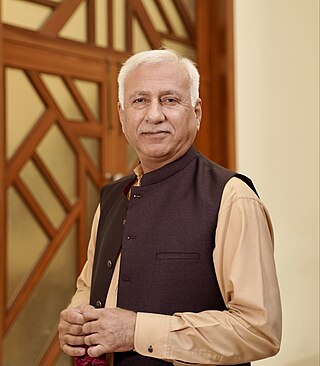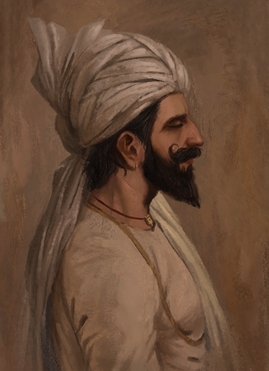
Punjab is a geopolitical, cultural, and historical region in South Asia. It is specifically located in the northwestern part of the Indian subcontinent, comprising areas of modern-day eastern-Pakistan and northwestern-India. Punjab's major cities are Lahore, Faisalabad, Rawalpindi, Gujranwala, Multan, Ludhiana, Amritsar, Sialkot, Chandigarh, Shimla, Jalandhar, Patiala, Gurugram, and Bahawalpur.

Sultan Bahu, was a 17th-century Punjabi Sufi mystic, poet, scholar and historian. He was active in the Punjab region during the reigns of Mughal emperors Shah Jahan and Aurangzeb.

Heer Ranjha is one of the four popular tragic romances of the Punjab. The other three are Mirza Sahiban, Sohni Mahiwal and Sassi Punnun. There are several poetic narrations of the story; the most famous being Heer by Waris Shah written in 1766. It tells the story of the love between Heer Sial and Dheedo Ranjha.

Chiniot is a city and the administrative headquarters of Chiniot District in the province of Punjab, Pakistan. Located on the bank of the river Chenab, it is the 28th largest city of Pakistan. It is also known for its intricate wooden furniture, architecture, and mosques, and is home to the Omar Hayat Mahal.

Jhang is the capital city of Jhang District in the central portion of the province of Punjab, Pakistan. Situated on the east bank of the Chenab river, it is the 18th largest city of Pakistan by population.
The Sial or Siyal is a Punjabi clan of Jats and also classified as Rajput in the Punjab region of the Indian subcontinent, split between India and Pakistan.
The Bar Region, or the Bars, is an area in Punjab, now part of the Punjab Province of Pakistan. The area consists of agricultural land that was cleared in the nineteenth century for the then 'new' canal irrigation system that the British were developing at the time. The soil of the Bar Region is fertile. The plains of fertile land have been created by the stream deposits driven by the many rivers flowing from the Himalayas.

Mir Tanha Yousufi was a Pakistani Punjabi and Urdu writer, best known for his Punjabi literature. He produced two short story collections and five novels in Punjabi. Most of his work was transliterated in Gurumukhi script in Indian Punjab. Besides his Punjabi works, he was a well known Urdu and Punjabi poet.

Chiniot District, is a district in the Punjab province of Pakistan. It became the district in July 2009. Before this, it was a tehsil of Jhang District.

Khawar Rizvi, who lived from 1 June 1938 to 15 November 1981, was a renowned poet and scholar of Urdu and Persian. Born as Syed Sibte Hassan Rizvi, he chose to adopt the pen-name "Khawar," which signifies "the east" in the Persian language, for the purpose of composing his poetry and essays. Highly reverent and captivated by the east, its way of life, and its inherent principles, Rizvi's profound affection for this region was unyielding.

Bhawana is a city and capital of Bhawana Tehsil of Chiniot District in Punjab, Pakistan. It is located on the bank of the Chenab river, bounded by Faisalabad, Jhang, and Chiniot, three other cities in Punjab.
Pindi Bhattian is a city and the administration headquarters of Pindi Bhattian Tehsil, Hafizabad District in Punjab, Pakistan. It is famous for being the birth place of a 16th-century Punjabi folk hero, Dulla Bhatti who led revolts against the Mughal rule in the Punjab.
Muhammad Masood Lali (born 21 August 1951), is a Pakistani politician from Kanwain Wala, Chiniot.
Punjabi Muslims are adherents of Islam who identify ethnically, linguistically, culturally, and genealogically as Punjabis. With a population of more than 109 million, they are the largest ethnic group in Pakistan and the world's third-largest Islam-adhering ethnicity after Arabs and Bengalis. The majority of Punjabi Muslims are adherents of Sunni Islam, while a minority adhere to Shia Islam. They are primarily geographically native to the Punjab province of Pakistan, but many have ancestry from the Punjab region as a whole.
Punjabis are the majority ethnic group in Pakistan. They celebrate a number of religious and cultural festivals:

Moeen Nizami is a Pakistani Urdu poet, literary and religious scholar specialized in Persian language and tasawwuf, and Allama Muhammad Iqbal studies 'Moeen' is his pen name,. He is a professor of Persian language and literature, Chairman Department of Persian, Head Hujveri Tasawwuf chair, University of the Punjab, Lahore, Pakistan. Nizami is an author of more than 50 Persian and Urdu books and more than 60 papers published in local and foreign journals. Two of his books were published in Tehran, Iran. He achieved two awards of best manuscript research by the Iran Ministry of Culture and Islamic Guidance in 2006 and 2007. Tasawwuf Classical and modern Persian, Urdu and Punjabi literature, Islamic Arts and literary translations are his special fields of interest.
Syed Hassan Murtaza is a Pakistani politician who had been a member of the Provincial Assembly of the Punjab from August 2018 till January 2023. He served as the Parliamentary Leader of Pakistan Peoples Party in Punjab.

Rai Ahmad Khan Kharal, widely known as Nawab of Jhamra, was a Punjabi Muslim chieftain of the Kharal tribe. He led a rebellion in the Bar region of Punjab against the British East India Company in the Revolt of 1857 and died fighting against it on 21 September 1857, at the age of 81. He is today considered a folk hero in rural Punjab, Pakistan.

Sial dynasty was a Punjabi chieftaincy that ruled over the Sial state (c.1727–1818) in central Punjab during 18th century. It was centred in Jhang.










